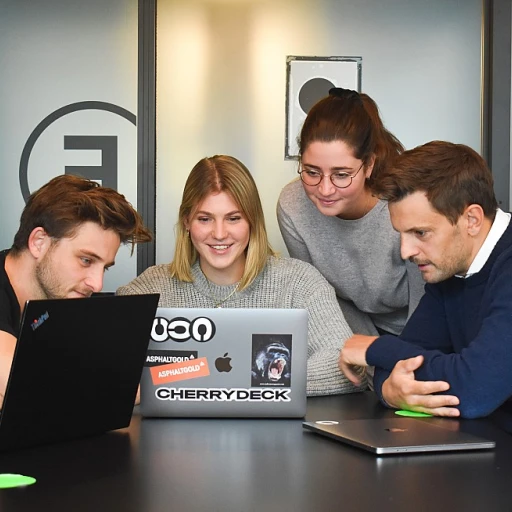
Understanding the Role of Peer Interviews
{Importance of Peer-to-Peer Interactions in Interviews
Understanding the role of peer interviews in the hiring process is crucial for both candidates and employers. This method offers a unique perspective into the job, culture, and dynamics of the organization. Peer interviews, where candidates are interviewed by potential team members, can provide invaluable insights that a traditional interview might miss. Peer interactions often delve into everyday work scenarios, emphasizing soft skills such as communication, problem-solving, emotional intelligence, and team fit.
While the hiring manager usually conducts the formal interview, the peer interview serves as a natural extension of the interview process, allowing candidates to ask questions peer to peer, thus gaining a clearer view of the company culture and work environment. It also helps the candidates to envision whether they fit the team and how well their skills match the job requirements.
Employers also benefit, as peer interviews offer an additional layer of feedback from team members who will likely work closely with the new hire. This feedback can provide insights on cultural fit and the candidate’s potential compatibility with the team, which is a crucial factor for long-term success in any role. Enhancing candidate experience with effective 360 feedback questions can further complement the insights gathered from peer interviews, ensuring a well-rounded evaluation process.
}
Benefits for Candidates
Candidate Perspective in Peer Interviews
Peer interviews add a unique layer to the candidate experience. Unlike traditional interviews, these interactions often provide candidates with a more authentic view of the company culture and team dynamics. Sharing time with potential peers gives candidates a better understanding of their expected role and the team environment they will join. This approach helps them gauge their potential cultural fit and assess if their communication style aligns with that of existing team members.
While peer interviews primarily aim to understand the candidate’s fit with the team, they also allow candidates to demonstrate their soft skills like problem-solving, emotional intelligence, and adaptability in real-world scenarios. It’s an opportunity for them to showcase these skills in a more casual yet revealing setting. Engaging in a relaxed conversation with peers can allow candidates to present their communication skills and other interpersonal abilities more naturally.
Moreover, through thoughtfully crafted interview questions, candidates can receive effective feedback, which not only helps in their professional growth but also in building trust and transparency in the interview process. It’s essential for candidates to leave the interview with a clear understanding of how their skills and personality align with the company’s expectations.
Lastly, peer interviews can significantly impact a candidate’s decision-making process. They often walk away with a stronger impression of the company culture and whether the job aligns with their career goals and personal values. This informed perspective derived from peer interactions will help candidates make more confident choices about their future with the company.
Benefits for Employers
Mutual Benefits of Peer Interviews
The peer interview process offers significant advantages for employers, contributing positively to the overall success of hiring strategies.- Alignment with Company Culture: Peer interviews play a crucial role in assessing a candidate's alignment with the company culture. Team members conducting these interviews can better evaluate potential cultural fit, ensuring that new employees will mesh well with the existing team dynamics.
- Insightful Evaluation of Soft Skills: Soft skills such as communication, problem solving, and emotional intelligence are hard to evaluate through traditional methods. Peer interviews provide a platform where candidates can demonstrate these abilities in real-time, giving employers a comprehensive understanding of the candidate's capacity to thrive in a collaborative environment.
- Efficient and Inclusive Hiring Process: By involving current employees in the interviewing process, companies can make more informed hiring decisions. Team members offer unique insights into what is needed for the role, shaping interview questions that probe deeper into the candidate's competencies and potential. This collaboration between hiring managers and team members can streamline the hiring process, optimizing the selection criteria for long-term success.
- Fostering a Cohesive Work Environment: When team members participate in the peer interview process, it fosters a sense of ownership and inclusion. This involvement not only boosts morale but also encourages team members to develop critical interview and evaluation skills themselves.
Implementing Peer Interviews Effectively
Steps to Seamlessly Integrate Peer Interviews
Implementing peer interviews effectively within your hiring process requires careful planning and execution. This approach not only enhances the candidate experience but also enriches the insights gathered during the interview process. Here are key steps to ensure a smooth integration:
Define Clear Objectives
Before initiating peer interviews, it's crucial to establish clear objectives. What do you hope to achieve by involving team members in the interview process? Whether it's assessing cultural fit, evaluating soft skills, or understanding a candidate's problem-solving abilities, having defined goals will help guide the process and ensure consistency across interviews.
Select the Right Team Members
Choosing the right team members to participate in peer interviews is essential. Look for individuals who possess strong communication skills and emotional intelligence. These peers should represent a cross-section of the company culture and embody the values you wish to see in new hires. Their insights will be invaluable in assessing whether a candidate will fit into the team and contribute positively to the work environment.
Prepare Peers with Training
To ensure the success of peer interviews, provide training to team members on effective interview techniques. This includes crafting relevant interview questions that align with the job requirements and company values. Training should also cover how to provide constructive feedback and assess a candidate's skills objectively.
Develop a Structured Interview Process
A structured interview process helps maintain consistency and fairness. Create a standardized set of questions that peers can use to evaluate candidates. This structure will help in comparing candidates objectively and ensure that all necessary aspects of the role and company culture are covered.
Gather and Utilize Feedback
After the peer interviews, collect feedback from the team members involved. This feedback should focus on the candidate's performance, potential cultural fit, and any concerns that may have arisen. Incorporate this feedback into the overall assessment of the candidate, providing a comprehensive view that will aid hiring managers in making informed decisions.
Review and Refine the Process
Finally, regularly review the peer interview process to identify areas for improvement. Gathering input from both candidates and peers can provide insights into what is working well and what could be enhanced. Continuous refinement of the process will help maintain its effectiveness and ensure it continues to meet the needs of both candidates and the company.
Common Challenges and Solutions
Overcoming Challenges in Peer Interviews
While peer interviews can significantly enhance the candidate experience, they are not without their challenges. Understanding these obstacles and implementing effective solutions can make the process smoother for both candidates and employers.
Ensuring Consistency in the Interview Process
One common issue is maintaining consistency across different peer interviews. Each team member might have a unique approach, which can lead to varied experiences for candidates. To tackle this, companies should provide clear guidelines and training for team members involved in the interview process. This will help ensure that all candidates are assessed using similar criteria, promoting fairness and objectivity.
Aligning Interview Questions with Company Culture
Another challenge is crafting interview questions that accurately reflect the company culture and values. It's crucial to prepare peer interview questions that not only assess technical skills but also gauge cultural fit and soft skills such as communication and emotional intelligence. By doing so, hiring managers can better determine if a candidate will fit into the team and contribute positively to the work environment.
Managing Time Effectively
Time management can be a hurdle, especially when coordinating multiple peer interviews. Scheduling can become complex, leading to delays and extended hiring timelines. To address this, companies should streamline the scheduling process and ensure that team members are available for interviews without disrupting their regular work. This can be achieved by using scheduling tools and setting aside specific times for interviews.
Providing Constructive Feedback
Finally, delivering constructive feedback to candidates post-interview is essential but often overlooked. Providing detailed feedback helps candidates understand their strengths and areas for improvement, enhancing their overall experience. Employers should establish a feedback mechanism that allows team members to share insights effectively, ensuring that candidates receive valuable information to aid their professional growth.













